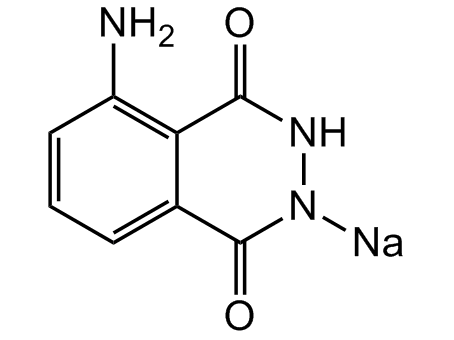Luminolmonosodiumsalt
Product Code:
CDX-L0014
CDX-L0014
Regulatory Status:
RUO
RUO
Shipping:
Ambient
Ambient
Storage:
+4 °C
+4 °C
No additional charges, what you see is what you pay! *
| Code | Size | Price |
|---|
| CDX-L0014-G005 | 5 g | £176.00 |
Quantity:
| CDX-L0014-G025 | 25 g | £670.00 |
Quantity:
Prices exclude any Taxes / VAT
Stay in control of your spending. These prices have no additional charges to UK mainland customers, not even shipping!
* Rare exceptions are clearly labelled (only 0.14% of items!).
* Rare exceptions are clearly labelled (only 0.14% of items!).
Multibuy discounts available! Contact us to find what you can save.
This product comes from: Switzerland.
Typical lead time: 7-10 working days.
Contact us for more accurate information.
Typical lead time: 7-10 working days.
Contact us for more accurate information.
- Further Information
- Documents
- References
- Related Products
- Show All
Further Information
Alternate Names/Synonyms:
3-Aminophthalhydrazide; 5-Amino-2,3-dihydro-1,4-phthal-azinedione
Appearance:
White to light yellow powder.
CAS:
20666-12-0
EClass:
32160000
Form (Short):
liquid
GHS Symbol:
GHS07
Handling Advice:
Keep cool and dry.Protect from light and moisture.
Hazards:
H315, H319, H335
InChi:
InChI=1S/C8H7N3O2.Na/c9-5-3-1-2-4-6(5)8(13)11-10-7(4)12;/h1-3H,(H4,9,10,11,12,13);/q;+1/p-1
InChiKey:
RVJVDCVIJCBUTH-UHFFFAOYSA-M
Long Description:
Chemical. CAS: 20666-12-0. Formula: C8H6N3O2Na. MW: 199.14. Synthetic. Very efficient and commonly used chemiluminiscent compound in many applications. Cyclic diacyl hydrazide that exhibits chemiluminescence upon oxidation. Oxidizing agents capable of initiating this particular reaction are nitrogen dioxide, PAN, hydrogen peroxide, ozone and other atmospheric oxidants. As an example, HRP combined with hydrogen peroxide as an activator, causes luminescent peroxidation of luminol. This reaction can be enhanced by certain phenol derivatives, such as p-substituted phenols. Luminol can also be oxidized and chemiluminesce, by compounds containing iron, copper, gold, and cyanide. Luminol is a reagent for the generation of chemiluminescence in biological assays including nitric oxide and myeloperoxidase assays or in fornensic blood tests. Spectral data: lambdaex=355nm, lambdaem=411nm.
MDL:
MFCD00161491
Molecular Formula:
C8H6N3O2Na
Molecular Weight:
199.14
Package Type:
Vial
Precautions:
P261, P305, P351, P338
Product Description:
Very efficient and commonly used chemiluminiscent compound in many applications. Cyclic diacyl hydrazide that exhibits chemiluminescence upon oxidation. Oxidizing agents capable of initiating this particular reaction are nitrogen dioxide, PAN, hydrogen peroxide, ozone and other atmospheric oxidants. As an example, HRP combined with hydrogen peroxide as an activator, causes luminescent peroxidation of luminol. This reaction can be enhanced by certain phenol derivatives, such as p-substituted phenols. Luminol can also be oxidized and chemiluminesce, by compounds containing iron, copper, gold, and cyanide. Luminol is a reagent for the generation of chemiluminescence in biological assays including nitric oxide and myeloperoxidase assays or in fornensic blood tests. Spectral data: lambdaex=355nm, lambdaem=411nm.
Purity:
>98% (HPLC)
Signal word:
Warning
SMILES:
NC1=C2C(C(N([Na])NC2=O)=O)=CC=C1
Solubility Chemicals:
Soluble in water (50mg/ml).
Source / Host:
Synthetic.
Transportation:
Non-hazardous
UNSPSC Category:
Chemiluminescent Reagents
UNSPSC Number:
41105332
Use & Stability:
Stable for at least 2 years after receipt when stored at +4°C.
Documents
References
(1) M.J. Cormier & P.M. Prichard; J. Biol. Chem. 243, 4706 (1968) | (2) G.H.G. Thorpe, et al.; Clin. Chem. 31, 1335 (1985) | (3) T.I. Quickenden & J.I. Creamer; Luminescence 16, 295 (2001) | (4) A. Fan, et al.; Anal. Sci. 25, 5877 (2009) | (5) Y.A. Vladimirov, et al.; Biochem. 74, 1545 (2009)
Related Products
| Product Name | Product Code | Supplier | |||||||||||||||||||||||||||||||||||||||||||||||||||||||||||||||||||||||||||||||||||||||||||||||||
|---|---|---|---|---|---|---|---|---|---|---|---|---|---|---|---|---|---|---|---|---|---|---|---|---|---|---|---|---|---|---|---|---|---|---|---|---|---|---|---|---|---|---|---|---|---|---|---|---|---|---|---|---|---|---|---|---|---|---|---|---|---|---|---|---|---|---|---|---|---|---|---|---|---|---|---|---|---|---|---|---|---|---|---|---|---|---|---|---|---|---|---|---|---|---|---|---|---|---|---|
| 6-Amino-D-luciferin | CDX-A0306 | Chemodex | Summary Details | ||||||||||||||||||||||||||||||||||||||||||||||||||||||||||||||||||||||||||||||||||||||||||||||||
| 6-Aminoseleno-D-luciferin | CDX-A0307 | Chemodex | Summary Details | ||||||||||||||||||||||||||||||||||||||||||||||||||||||||||||||||||||||||||||||||||||||||||||||||
| 2',7'-Dichlorofluorescein | CDX-D0004 | Chemodex | Summary Details | ||||||||||||||||||||||||||||||||||||||||||||||||||||||||||||||||||||||||||||||||||||||||||||||||
| N,N-Dimethyl-6-propionyl-2-naphthylamine | CDX-D0077 | Chemodex | Summary Details | ||||||||||||||||||||||||||||||||||||||||||||||||||||||||||||||||||||||||||||||||||||||||||||||||
| 4-[4'-(2'-Methyl)thiazolyl]phenol | CDX-M0006 | Chemodex | Summary Details | ||||||||||||||||||||||||||||||||||||||||||||||||||||||||||||||||||||||||||||||||||||||||||||||||



